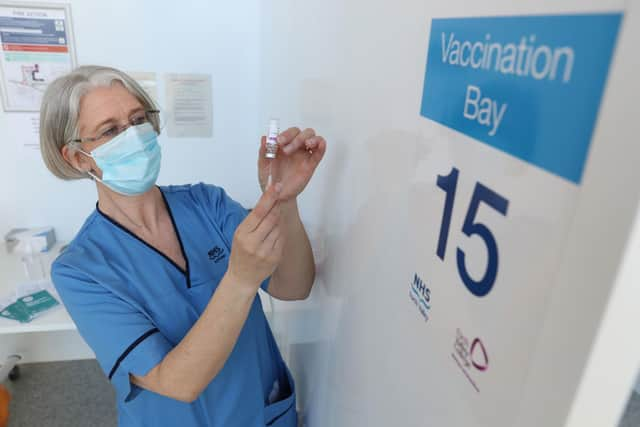Vaccine rollout for under-50s may undergo rethink as supplies are set to dip by 500,000
Scotland’s clinical director, Jason Leitch, told the Scottish Parliament’s Covid-19 committee that the reduction in supply reported today would mean that existing vaccine stock would be concentrated on second doses for people who have already received their first vaccination.
His comments come as First Minister Nicola Sturgeon admitted that Scotland will have 500,000 fewer coronavirus vaccine doses over the next month than anticipated and warned that there may be times in April where second doses will have to be prioritised.Speaking ahead of First Minister’s Questions, the first minister said: “At present we expect that over the next month we will have approximately 500,000 fewer doses than we had previously anticipated. For that reason there may be periods in April where we need to prioritise second doses.
Advertisement
Hide AdAdvertisement
Hide Ad“However, I want to be clear today that we do still expect to offer a first dose of the vaccine to the remaining JCVI priority groups by the middle of next month as planned… we also still expect to have offered a first dose to all adults in the population by the end of July.”


A letter sent out to local health organisations in England stated that there has been a "reduction in national inbound vaccines supply" and asks organisations to "ensure no further appointments are uploaded" to booking systems in April. It is understood that a delay in vaccine shipment from India may be partly responsible for the patchy supply.
Mr Leitch said: “We always said that everything was supply dependent. We have modelled as much as we can and our present understanding is that we can still meet the mid April offer to everybody in the top nine groups of a first vaccination and the mid July target for others. However, it may mean that after the top nine, we will have to think about who comes next and when they come next.”
He added: “It is a significant reduction across the whole of the UK. We will feel that proportionately just as Northern Ireland, Wales and England will as well."
Mr Leitch said the issues were due to “lumpy” supply. The Scottish government said it was "seeking clarity" from the UK Vaccine Taskforce on future supplies.


He said that second doses of the vaccine would not be affected by the supply issue, as most people due a second jag have had the Pfizer vaccine, which was approved first in the UK.
A total of 51,405 people in Scotland received their vaccinations yesterday, according to the latest figures. A total of 2,023,002 people have now received their first dose.
The letter to English health boards said: “The government’s Vaccines Taskforce have now notified us that there will be a significant reduction in weekly supply available from manufacturers beginning in the week commencing March 29, meaning volumes for first doses will be significantly constrained.”
Advertisement
Hide AdAdvertisement
Hide AdA spokesman for the Department of Health and Social Care said: “Health services across the UK are working tirelessly to vaccinate those most at risk and more than 25 million people have already received their first jab.The vaccination programme will continue in the coming weeks and more people will continue to receive first and second doses.
“As has been the case since the programme began, the number of vaccinations carried out over time will vary due to supply – but we remain on track to offer a first vaccine to over 50s by 15 April and all adults by 31 July.”
The UK Government said that each week, it shares a 13-week forecast with the four nations, as well as a six-month forward look which is shared on a monthly basis. It said this helps the devolved governments ensure deployment can be planned effectively and aligned to forecast supply.
He added: “We remain confident in our vaccine supplies and are in constant contact with manufacturers and supply chain partners to understand and address potential variations in supply.”
The UK health secretary told MPs at Westminster that the UK-wide vaccination programme remains on course to hit its targets.
Matt Hancock said: “The targets to offer a vaccine to everyone aged 50 or over by April 15 and to all adults by the end of July, I can confirm we are on track to meet both of these targets.
“I also want to clear up some rumours that have been circulating and give people reassurance. There will be no weeks in April with no first doses. There will be no cancelled appointments as a result of supply issues – second doses will go ahead as planned.
A spokesperson for AstraZeneca said: "Our UK domestic supply chain is not experiencing any disruption and there is no impact on our delivery schedule."
Advertisement
Hide AdAdvertisement
Hide AdCurrently only the Pfizer and Oxford Astra Zeneca vaccines are being used in the UK. However, the Moderna vaccine has also been approved and is expected to begin shipping to Britain next month. Other vaccines, including Novavax, which is to be manufactured in the north east of England, are also expected to be approved and rolled out for use later in the year. Data from trials released last week found that the Novavax vaccine is safe and effective against both the original stain of coronavirus and the more transmissible Kent strain.
A message from the Editor:
Thank you for reading this article. We're more reliant on your support than ever as the shift in consumer habits brought about by Coronavirus impacts our advertisers.
If you haven't already, please consider supporting our trusted, fact-checked journalism by taking out a digital subscription.
Comments
Want to join the conversation? Please or to comment on this article.